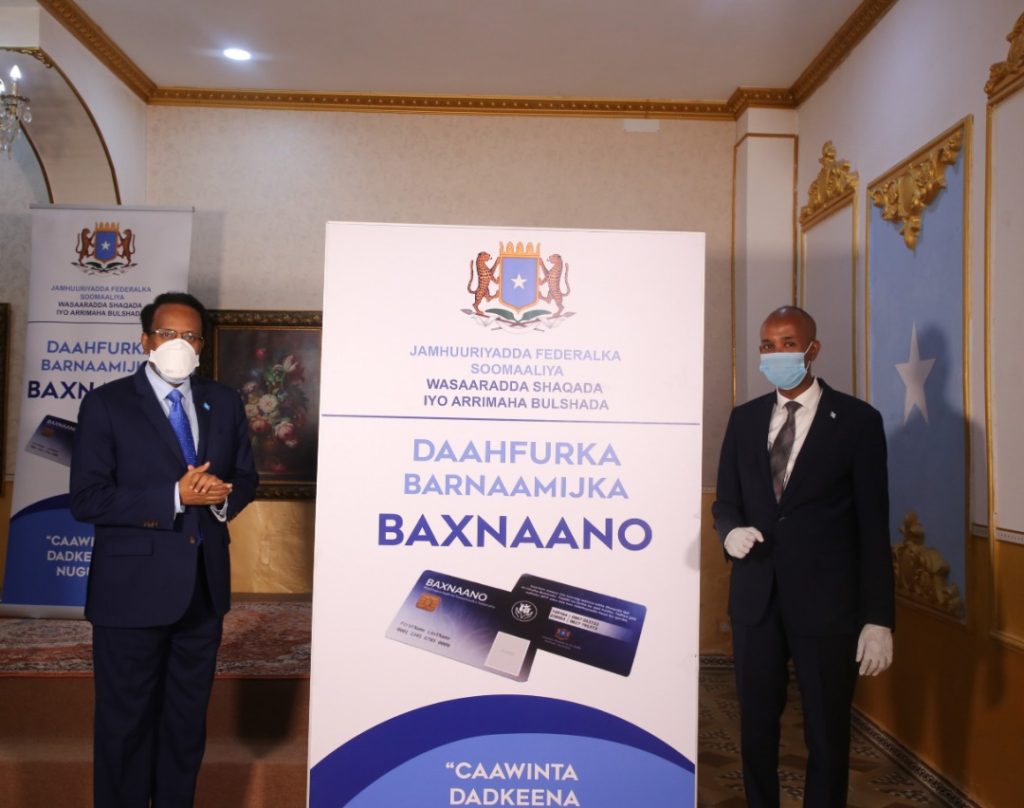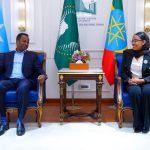Mogadishu(SONNA)-The President of the Federal Republic of Somalia, H.E. Mohamed Abdullahi Farmajo, has today launched at the presidential palace a nationwide social safety net programme, which is better known as “Baxnaano”, to help protect the poor and vulnerable families.
The Baxnaano program is funded with pre-arrears clearance grant from the International Development Association (IDA) of the World Bank as an integral part of the National Social Protection Policy, which is being carried out under the leadership of the Ministry of Labour and Social Affairs (MoLSA). The Baxnano programe is intended to provide cash transfers to targeted poor and vulnerable households and establish the key building blocks of a national shock-responsive safety net system.
The manager of Baxnaano Programe Ms Fardowso Ahmed Abdullahi has underlined that the programme as part of national social protection policy envisages a longer-term development approach that builds the government’s capacity to take the lead in delivering social protection interventions for Somali people in the next 20 years and also stressed that it will gradually move the country away from the current humanitarian regime.
H.E. Abdirahman Duale Beyle, Minister of Finance of the Federal Government of Somalia said the program is of great importance for the country, as it reaches vulnerable communities, and affirmed that its implementation is part of the ongoing debt relief efforts. The Minister reiterated the importance of debt relief efforts as it opens the government the opportunity to secure such critically needed developmental funds from the International Financial Institutions (IFIs)
Minister of Labour and Social Affairs of the Federal Government of Somalia, H.E. Sadik Hirsi Warfa, described the inauguration of the program as a significant accomplishment for Somali people as they will be receiving direct assistance from the government for the first time, targeting the most vulnerable communities. Minister Warfa stressed the commitment of MOLSA in institutionalising a structure that guarantees assistance for the very poor and protect the vulnerable from livelihood risks with the express goal of creating effective & sustainable social safety nets and ladders out of poverty.
“The Baxnaano program is anticipated to target 200,000 poor and vulnerable households (approximately 1.3 million individuals) across the Federal Member States of Somalia and provide them with nutrition-linked cash transfer. The families will be able to use the money for their immediate needs, such as food and basic services. This programme will be executed in areas of fragility due to widespread poverty, acute drought and long-drawn-out conflicts and insecurity” said Minister Warfa.
The President of Somalia, Mohamed Abdullahi Farmajo, praised the Government’s efforts by reasserting its commitment of revitalizing basic public services while improving job creation opportunities, livelihoods and the country’s economy. The President pointed out that the launch of the Baxnaano program coincided with a period that COVID-19 is negatively affecting the lives, jobs and businesses of Somali people.
“We have the 9th National Development Plan that sets out in detail our plan to tackle poverty, food shortages, with a focus on improving the lives of vulnerable people, such as droughts, tornadoes, diseases and natural disasters which confront us periodically” said the President.
President Farmajo has instructed the Government, particularly the Ministry of Labour and Social Affairs to carry out the Baxnaano pragram in a transparent and fair manner, while taking care of the poor families until they reach a level of self-sufficiency, with the intention of reaching out millions of Somali citizens who are in dire need of government services.
MoLSA is the primary institutional home for the Baxnaano program which will be conducted in 21 districts. The program is being administered through MoLSA’S Social Affairs Department which is responsible for the day-to-day management of the programe in close collaboration with United Nation’s World Food Programme and United Nations Children’s Fund.





